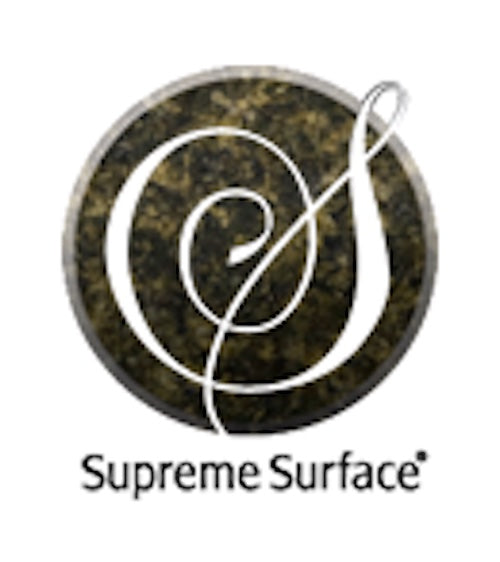How to Remove Hard Water Spots from Quartz Countertops (2026 Expert Guide)
Share
68% of stone countertops installed in 2025 were polished white quartz—and every single one is susceptible to stubborn mineral deposits.
As the industry leader in stone restoration since 1996, we know firsthand that the "stain-proof" marketing hype is a myth. If you see cloudy spots or white rings around your sink, those are mineral deposits that have physically anchored to your quartz's resin binder.
What Water Spots Actually Are
Hard water spots are a combination of calcium, magnesium, and soap scum that bond to the surface as water evaporates. On white quartz, these look identical to etch marks (chemical burns).
The Good News: They are removable if you use the correct technique.
Why pH-Neutral Cleaners Fail To Clean Water Spots
Every quartz manufacturer requires pH-neutral cleaners for daily maintenance. This is vital for the surface's longevity, but neutral cleaners cannot dissolve bonded minerals.
THE DANGER: Do not use Vinegar, CLR, or Lemon Juice. These acids will chemically burn (etch) the polyester resin in your quartz in under 30 seconds.
THE ONLY QUARTZ-SAFE REMOVAL METHOD (2026)
✅ DO THIS — Works For Me 100% of the Time
- New Straight Razor Blade: For heavy, "crusty" mineral build-up, hold a new blade at a 30° angle. Make one slow, controlled pass to shave the mineral off the surface.
- Grade #0000 Super-Fine Steel Wool: Use only this grade, dry - not wet. Using in a light, circular motion, look for changes every 3-5 seconds. This is the only safe abrasive fine enough to remove minerals without scratching polished quartz (countertops only, not sinks).
- The "Seal" Step: Immediately clean and protect the area with Supreme Surface® All-In-One Stone Care. The ioSeal® technology fills the microscopic imperfections you just cleaned, preventing new minerals from anchoring.
❌ NEVER DO THIS — Permanent Damage Alert
- Household Acids: Vinegar, Lemon, CLR, or Bar Keepers Friend → Instant chemical etching.
- Coarse Abrasives: Green Scotch-Brite pads or #00 Steel Wool → Permanent micro-scratches.
- Magic Erasers: These are abrasive melamine foam and will strip the surface binder and factory polish.
PREVENT WATER SPOTS FOREVER (THE IOSEAL® ADVANTAGE)
Stop cleaning and start protecting. By using Supreme Surface® Treatments with ioSeal®, you are performing an "ionic upgrade" to your countertop every time you wipe it down.
- Repels Minerals: Water beads and wipes off before minerals can bond.
- UV Shield: Protects white quartz resins from yellowing—a common issue in 2026 sun-drenched kitchen designs.
- Modern Finishes: The only solution proven to protect 2026's trending matte, leather, and suede finishes.
Want the Full Story?
For a deeper dive into the science of quartz care, "ghost stains," and professional restoration tips, visit our Educational Resource Hub at SupremeSurface.com.
Tom Munro — 40-year tile & stone veteran & founder of Supreme Surface®





7 comments
My wife used a abrasive solution that took the shine doled it. How do I bring that top back? Did I get a polishy wheel? Some type of Polish bring her back. She was trying to get rid of dye hair dye she tried to rub it up and doled it all over the place. So what can I use? Can you please help me to let me know. Much appreciated. Thank you
I want to say THANK YOU! I have tried a number of products and parts of my black composite sink was ruined by the abrasive scrubber used as directed. And it still looked awful.
I watched YouTube and found your product and thought why not before buying a new sink. The first application removed majority of stains but applied another coat of mineral scrub remover. To restore the finish, applied 511 restoration and then the ISO sealant. It looks brand new!
BONUS!! Used only your scum and mineral product in an attempt to removing hard water stains from matte black faucets and it worked! Ruined other black faucets from using harsh products and recommended scrubber, so this time to scrub I used #0000 wool. Amazing results!!!!!! Thank you again!
I have hard water and have water spots on my quartz, what can I use to help?
Water spots on my brand new white quartz after wiping down the first time with only water and dried with towel right away. Other areas show smears. What can be done?
I have new white quartz countertops and they have little smudges in a few areas (almost like fingerprints). Me area is a little larger (almost like the size of a glass ring). I’ve tried dish detergent and warm water but this does not remove these smudges. Any advice would be extremely appreciated. Thank you!